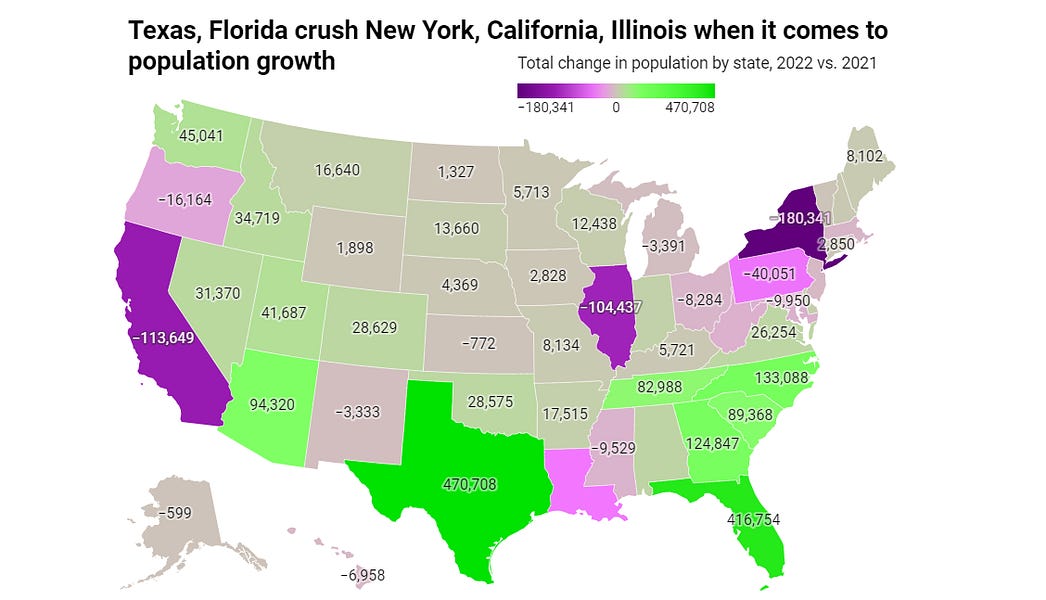NO ONE IS MOVING FOR THE WEATHER
As we say in Nevada, California Governor Gavin Newsome is a tremendous realtor. With every edict he passes and every sentence he utters, home values in bordering states go up.

Capital Thinking • Issue #1173 • View Online
A lot of data was just released that showed migration patterns in the United States. It’s not a surprise to anyone paying attention. I wrote about my move here.
My friends at Wirepoints put together a lot of data on the great migration. They have been talking about it for a number of years so they are very familiar with the data and not just a bunch of carnival barkers like the people trying to discredit them.

Wirepoints cited a new national survey that shows the migration isn’t ending. In fact, it’s just starting to pick up steam. What was just a trickle of people moving is now a full-blown river of people that have the ability to move. When it was a trickle, politicians could explain it away by saying it was the weather.
No one is moving for the weather. They are moving due to taxes and politics. To be clear, the more you are taxed and regulated the less freedom and individual liberty you have. That goes for the nation, and it goes for the states.

I will fully admit, if the trading floor was still around I would be on it and living in Chicago no matter what. Even at age 60, I’d be toiling in the pits every day although I might be trading differently today than I did at age 30. However, that doesn’t exist anymore.
One of the unintended consequences of COVID and the way it was politicized by Democrats to get rid of Trump was that people were locked out of their workplaces. Work from home is now enshrined in the workplace for jobs that can do that. Those jobs are generally virtual, which means they are mobile. The embrace of COVID to turn it into a political cudgel might bite Democrats in the ass.
Just an FYI before you do the happy dance that you don’t have to commute to an office you might check out the study Chicago Booth Professor Mike Gibbs ran on tech companies’ work-from-home production.
We study employee productivity (output per hour worked) before and during the working from home [WFH] period of the Covid-19 pandemic, using personnel and analytics data from over 10,000 skilled professionals at a large Asian IT services company. Hours worked increased, including a rise of 18% outside normal business hours. Average output declined slightly and employee productivity fell 8-19%. We then analyze determinants of changes in productivity. An important source is higher communication costs. Time spent on coordination activities and meetings increased, while uninterrupted work hours shrank considerably. Employees networked with fewer individuals and business units, both inside and outside the firm. They received less coaching and 1:1 meetings with supervisors. The findings suggest key issues for firms to address in implementing WFH policies.
Gibbs uncovered some pretty huge issues going forward for all companies if they embrace a fully work-from-home system. There are a lot of costs to working from home that was not apparent in the beginning but there was no other choice so companies had to absorb them.
Now that companies are catching their breath, they ought to take a real look at the costs versus opportunity costs of the work-from-home system. My advice is if you are a newer employee or a younger employee, go to the office.
We are in a recession despite what the cognoscenti say and I am predicting that firms will start to lay off more and more people. If you are in the office and present you can form human-to-human physical relationships. It’s a lot harder to lay off people if you have a physical relationship than it is a virtual one.
I also think that a lot of mentoring and other non-specific work-related things happen when you are physically present which can be an advantage to your career. The discipline that comes with going to an office is helpful in my opinion.
The Trafalgar data is super interesting because people aren’t moving for the weather. They aren’t moving for the taxes either, although it is a simple fact red states have lower taxes than blue states. It’s not just conservatives but independents as well. They are moving to live among people that have similar political views as them.

